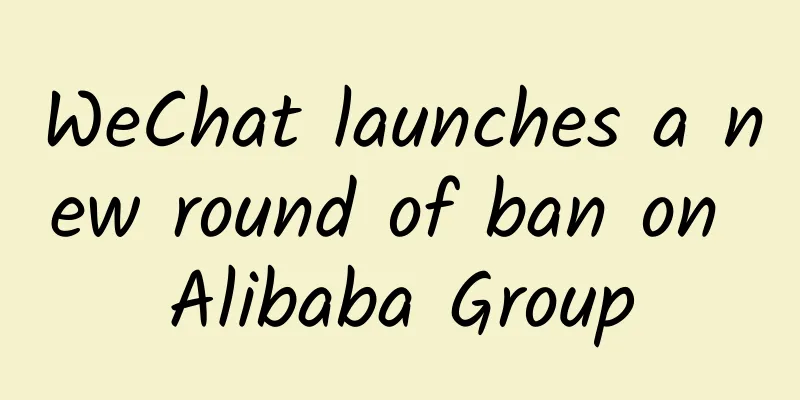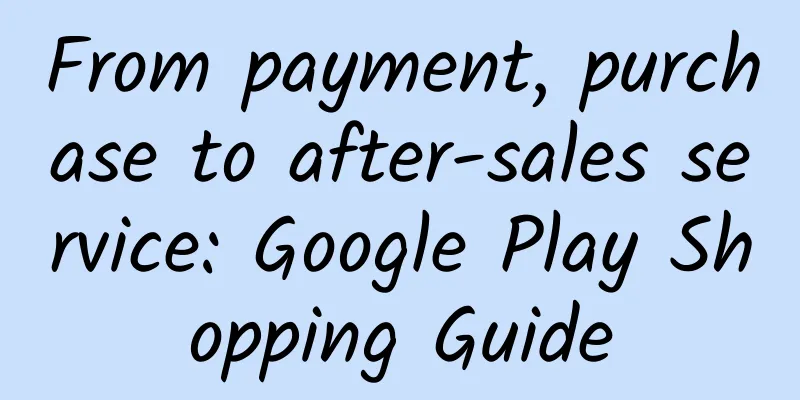WeChat launches a new round of ban on Alibaba Group

|
The conflict between Alibaba and Tencent has escalated again, with many Alibaba products being completely blocked by WeChat . Yesterday, after Alipay red envelopes were blocked by WeChat half a day after they were launched, WeChat stores completely banned Alipay from receiving and paying. In addition, Beijing Morning Post reporters learned from Xiami Music CEO Wang Hao that Ali's Xiami Music and Tiantian Dongting were also completely blocked by WeChat. Previously, Kuaidi's red envelopes, which were invested by Ali, had been blocked. This blockade is WeChat's most intense response to Ali's blocking after Taobao blocked WeChat a year ago. WeChat said firmly, "When Ali connects to WeChat payment, we will talk about this issue again." WeChat sellers can no longer use Alipay Perhaps in the near future, merchants will have to choose their side more clearly: Alibaba or Tencent? Yesterday, more than 8 hours after Alipay red envelopes were opened on WeChat and QQ, they were blocked by WeChat. Subsequently, many merchants reported that their stores opened on the WeChat platform could not use Alipay to receive and pay. According to data from Ebrun, 60% of WeChat merchants use Alipay to receive and pay within WeChat, which means that if the Alipay interface is cut off, 60% of WeChat merchants will be affected. In this regard, an industry insider speculated that as the conflict between Alibaba and Tencent further escalates, they may face a situation where they have to choose one side or the other. On the afternoon of February 2, merchants reported that they were unable to use Alipay. The sellers only saw a page prompt saying "Taobao has blocked browsing requests from WeChat." WeChat said that it was because Taobao blocked WeChat. In response, Alipay said that it did not block any interface call requests from merchants on the WeChat platform, but WeChat blocked all links or requests related to Alipay on the WeChat platform. Alipay and Taobao are two independent companies. Taobao blocking WeChat links and WeChat banning Alipay are two different things. Alipay insiders hinted that WeChat is confusing the public. Alipay and WeChat have been fighting for several rounds How big is the impact of WeChat's ban on Alipay? In fact, as early as February last year, Alipay announced that it would stop accepting WeChat's payment interface applications; for customers who have already applied, Alipay will gradually withdraw. In other words, sellers on WeChat will no longer be able to use Alipay. However, yesterday, a Beijing Morning Post reporter learned from Alipay that Alipay did not take any measures after issuing the statement, and is still renewing and signing new merchants' Alipay interface applications. This means that a considerable number of businesses and users on WeChat are still using Alipay to pay. According to a survey conducted by Ebrun in September last year, Alipay is the main payment method for many WeChat merchants. 60% of users use Alipay to make purchases on WeChat, while WeChat payment accounts for only 34%. Sun Taoyong, the founder of Weimob, also said that among the merchants he cooperates with, the most mainstream payment method is still Alipay. Now that WeChat has cut off Alipay, some merchants on the WeChat platform will face a difficult choice. WeChat responded by saying that merchants affected by payment restrictions during this period are welcome to use WeChat Pay. In order to facilitate the use of faster and safer payment methods, it has been continuously optimizing the WeChat Pay access process, achieving an average of 3 days for fast access to WeChat Pay, while providing supporting measures such as no deposit and T+1 settlement to bring better service experience to merchants. This is not the first time that the battle between the two major traffic platforms has caused "harm" to merchants. In 2013, the two sides had several rounds of blocking wars. For example, Taobao service platform blocked WeChat and WeChat links, and WeChat had already blocked all kinds of Taobao marketing accounts. Tencent may ban all Alibaba products Yesterday afternoon, Xiami Music CEO Wang Hao confirmed to a Beijing Morning Post reporter via WeChat that the two music apps, Xiami Music and Tiantian Dongting, can no longer be shared on WeChat, and he commented on a picture in WeChat Moments, "Finally they have done it." Just a few days ago, Kuaidi Red Packet and Alipay Red Packet were blocked by WeChat. A Tencent staff member told the Beijing Morning Post that the response to this matter is still under further review. WeChat officially stated that as the Spring Festival approaches, user reports received by the WeChat platform show that a large part of the sources of violations such as the sale of counterfeit goods, fake red envelopes, and fraud come from the sharing of links on a few third-party platforms. In order to protect the rights and interests of users and avoid related risks from the source, the WeChat public platform will gradually rectify the illegal third-party platform behaviors in the near future. "WeChat Moments is a niche and private circle built by acquaintances, and WeChat red envelopes are a fun way for friends to interact and express emotions. We will never allow anyone to conduct malicious marketing in the name of red envelopes and destroy the Moments experience. In the near future, we will gradually crack down on such illegal behaviors. When the Ali system is connected to WeChat payment, we will talk about this issue again." In the view of industry insiders, Tencent will no longer be "soft" in its actions against Ali. Open Internet Is it always just empty talk? As the battle for mobile market share deepens, the friction between Alibaba and Tencent, the two largest traffic platforms in China, is also increasing. On February 2, Alipay red envelopes were launched on WeChat, which was seen as the fuse of the battle between Alibaba and Tencent. Alipay red envelopes were banned on WeChat more than 8 hours after they were launched, and then Alipay, Xiami Music and other products were banned. This ban is the most severe one that WeChat platform has taken against Alibaba products. Before this, WeChat had banned all kinds of marketing accounts of Alibaba products, and Taobao Mobile blocked WeChat, WeChat could not jump to Taobao products and stores, and severely cracked down on WeChat marketing by store owners, and Taobao stores were not allowed to contain the word "WeChat". However, Tencent officials have never directly issued such a "provocation" to Alibaba - "wait until Alibaba connects to WeChat payment before talking." With the development of the two giants, Alibaba has absolute advantages in business and Tencent in social networking. At the same time, both have weaknesses that cannot be ignored, namely Alibaba's social networking and Tencent's business. For Alibaba, it cannot let users develop shopping habits on the WeChat platform, nor can it allow merchants to open stores and sell goods on WeChat public accounts, and it cannot allow WeChat to become a mobile e-commerce channel and platform, because this will threaten the future of Alibaba as a whole. As for Tencent, of course, it will not allow Alibaba to use its own relationship chain for marketing, or even step on the shoulders of WeChat to take a social path. In the eyes of e-commerce expert Gong Wenxiang, the so-called openness of the Internet has always been an empty talk. For large companies, making money is always the first priority. Failure to share the two major resource platforms is undoubtedly a loss for merchants and users. From a business perspective, it is difficult to judge right from wrong. Ensuring one's own interests, being responsible for the company and employees, and allowing the company to survive in a cruel market may be the greatest manifestation of responsibility. Both companies are playing games and competing to protect their own ecology and future development. As a winner of Toutiao's Qingyun Plan and Baijiahao's Bai+ Plan, the 2019 Baidu Digital Author of the Year, the Baijiahao's Most Popular Author in the Technology Field, the 2019 Sogou Technology and Culture Author, and the 2021 Baijiahao Quarterly Influential Creator, he has won many awards, including the 2013 Sohu Best Industry Media Person, the 2015 China New Media Entrepreneurship Competition Beijing Third Place, the 2015 Guangmang Experience Award, the 2015 China New Media Entrepreneurship Competition Finals Third Place, and the 2018 Baidu Dynamic Annual Powerful Celebrity. |
>>: Online video vs. TV: TV still has the upper hand in 2015
Recommend
The sales data analysis ideas you must sort out before "Double 11"
The case is this: An e-commerce company that sell...
Why are there so many "asymptomatic infections"? What's the difference between asymptomatic infections and positive tests?
As the weather gets colder, the COVID-19 outbreak...
How do WeChat public account operators attract traffic through Alibaba platforms?
Some people say that Alibaba and Tencent are inco...
OPPO, vivo, Xiaomi, Huawei: Among the four domestic companies, who is the marketing veteran?
OPPO and vivo , which were ridiculed as factory g...
Douyin Training Camp Project Practice (Operation)
As the pressure of employment competition becomes...
Smart router technology breaks through the separation of body and network port and becomes a manufacturing trend?
With the progress of the times and the developmen...
5 strategic thinking to build a brand with lasting competitiveness
When making plans, some marketers do not have a f...
How to acquire B-side customers?
I have a knowledge planet where I receive many qu...
This is how professional cat lovers suck cats...
According to a British study, 82% of girls find b...
A guide to creating short video content!
Short videos are the most popular form of communi...
From 0 to 1, reshaping the Xiaohongshu "Internet celebrity" brand
In the past few years, Internet celebrity brands ...
Xiaomi is on the left and Meizu is on the right
Meizu has been waiting for a long time for the op...
The Shanghai court accepted the appeal of Wang Zhenhua, the defendants Wang Zhenhua and Zhou Yanfen molested children!
The official WeChat account of the Shanghai Secon...
The main culprit of holiday syndrome is a drop in adrenaline secretion! Is that all?
Niu Niu: My vacation balance is insufficient and ...









